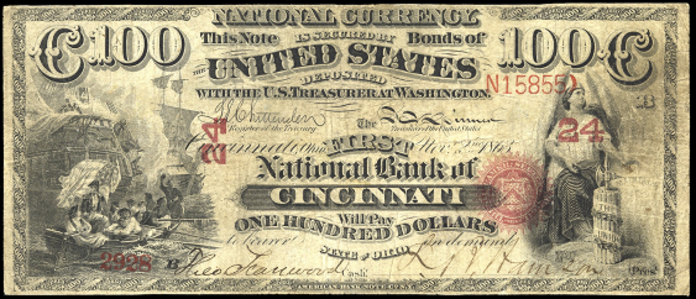One Hundred Dollar Notes › Nationals › 1863 One Hundred Dollar Original Series National Bank Notes › Massachusetts Charters › 1863 $100 Haverhill Massachusetts Haverhill National Bank
Get Value Now
| Item | Info |
|---|---|
| Series | 1863 |
| Charter | #484 Haverhill National Bank of Haverhill, Massachusetts |
| Year Chartered | 1864, 503 Banks Chartered |
| City Info | Haverhill is a city in Essex County, Massachusetts, United States. The population was 60,879 at the 2010 census. Located on the Merrimack River, it began as a farming community of Puritans, largely from Newbury Plantation. The land was officially purchased from the Pentuckets on November 15, 1642 for three pounds, ten shillings. Pentucket was renamed Haverhill and would evolve into an important industrial center, beginning with sawmills and gristmills run by water power. In the 18th and 19th century, Haverhill developed woolen mills, tanneries, shipping and shipbuilding. The town was for many decades home to a significant shoe-making industry. By the end of 1913, one tenth of the shoes produced in the United States were made in Haverhill, and because of this the town was known for a time as the "Queen Slipper City". The city was also known for the manufacture of hats. Source: Wikipedia |
| Similar Cities | If your note doesn't match try: 1. Haverhill, Massachusetts - First National Bank 2. Haverhill, Massachusetts - Essex National Bank 3. Haverhill, Massachusetts - Merrimack National Bank |
| Seal Varieties | Red with rays |
| See Also | If your note doesn't match try: 1. 1863 $100 Compound Interest Treasury Note 2. 1864 $100 Compound Interest Treasury Note 3. 1863 $100 Gold Certificate 4. 1861 $100 Interest Bearing Note 5. 1863 $100 Interest Bearing Note 6. 1864 $100 Interest Bearing Note |
| Other Info | 1. Value depends on notes known for charter, condition and market demand. |
| Neat Fact | Abraham Lincoln signed the National Currency Act on Feb. 25, 1863 (Kelly, 5th Ed. P1) |
No Obligations Offers and Appraisals
Please submit a good photo or scan. It will be identified and evaluated. Understand there may be subtle differences between the image you see above and your note. Signatures, design, markings and note condition will determine the offer price. Notes in Uncirculated or better condition receive the best offers.
Appraisals can be estimated for wholesale and retail prices. Wholesale is what dealers typically pay. Retail is what a collector might pay. Retail is slightly higher in most cases.
Please visit this page for USA Paper Money Reference. Do not treat this page as a reference guide, it is for appraisal and acquisition purposes only.
